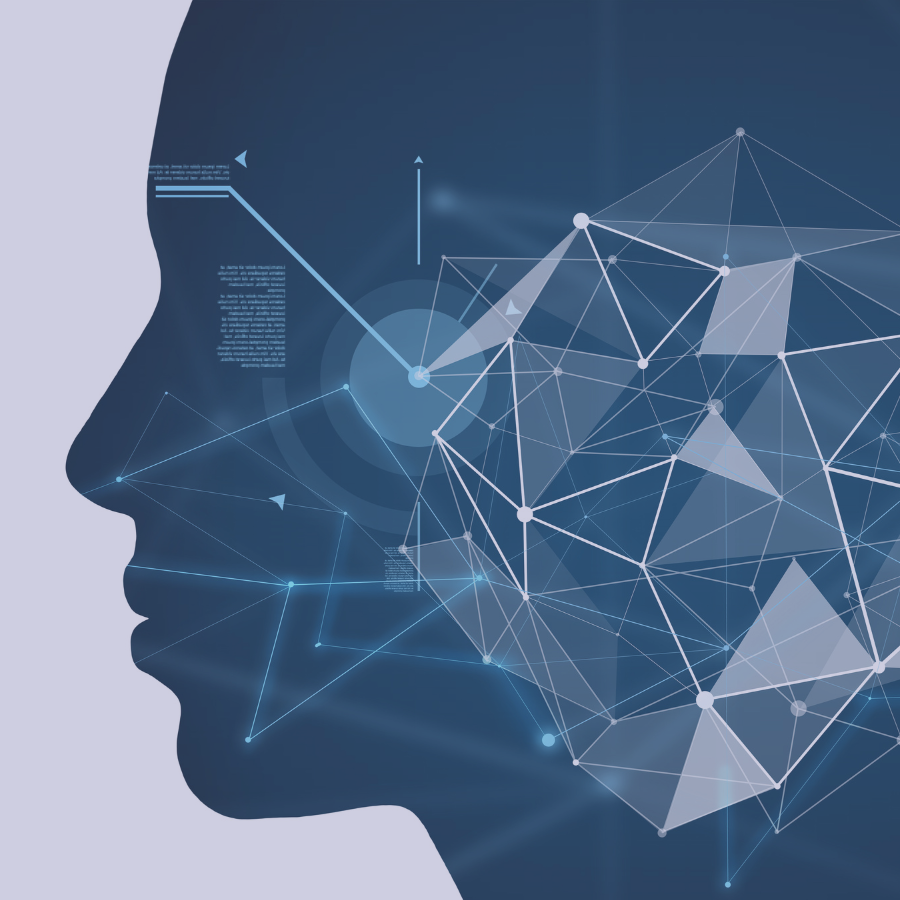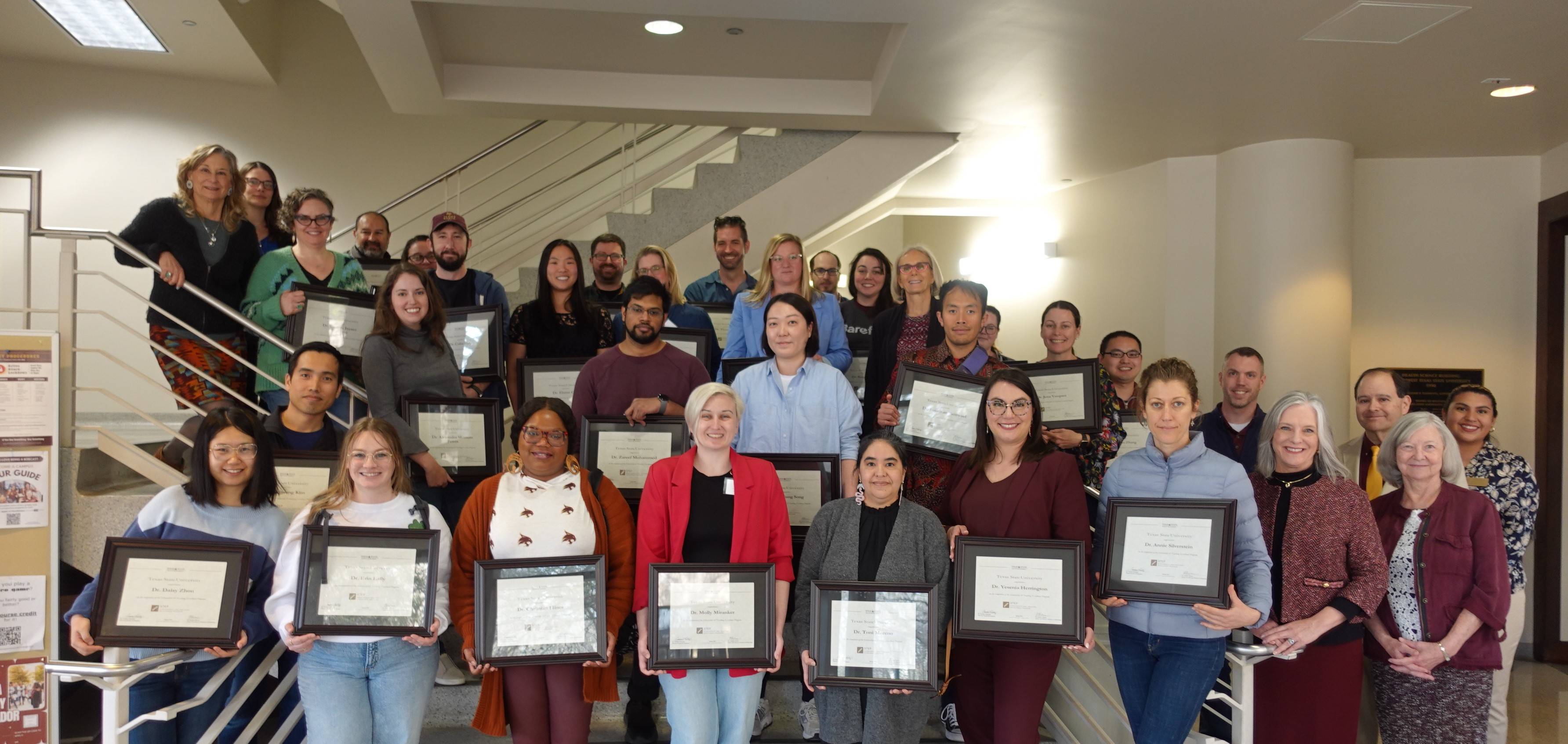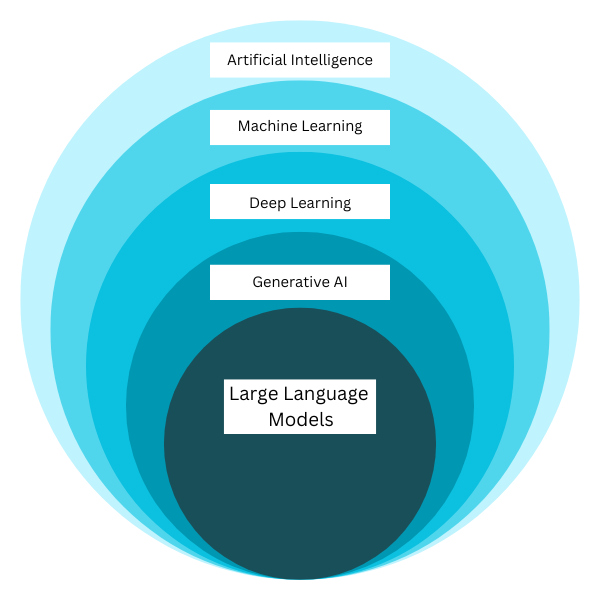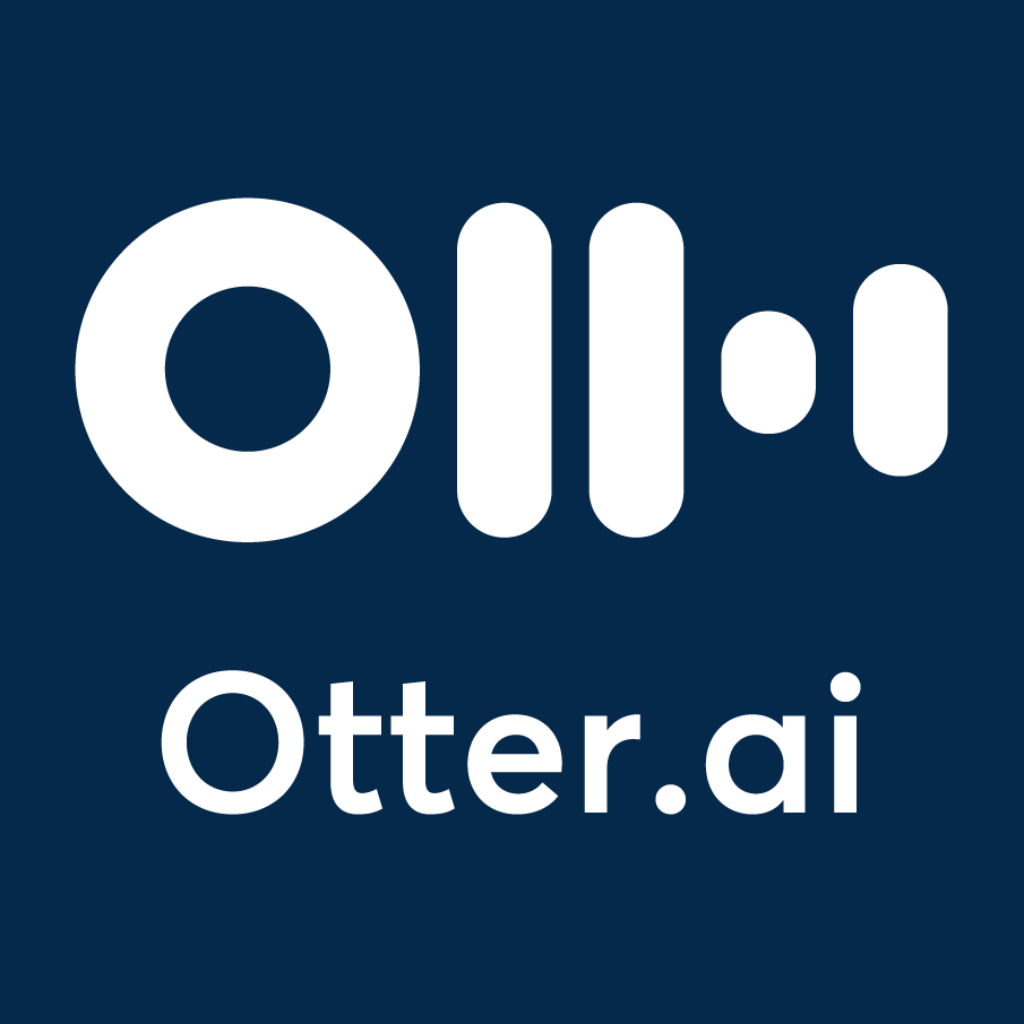Artificial Intelligence (AI) in Academia

Artificial Intelligence (AI) refers to technology that looks like human intelligence, but operates through complex algorithms and data processing. While the technology has been present in some capacity for decades, recent advances in AI have sparked a new age in technology that affects not only education, but also the evolving landscape of the workforce for years to come.
Types of AI
Theories of Artificial Intelligence generally fall into one of three major categories:
Narrow
Performs a single narrow task like facial/speech recognition, driving a car, or internet searches. This is the only type of AI that currently exists.
General
Called Strong or Deep AI, mimics human intelligence and can learn/apply its intelligence to solve any type of problem. Does not currently exist.
Super
This purely theoretical type of AI goes beyond mimicking humans and becomes self-aware, with the ability to surpass human intelligence and ability.
Narrow AI is the only type of intelligence that is successfully being realized today. Because every type of AI that is currently in use falls under the Narrow Intelligence AI category, all references to ‘AI’ in this resource refer to that type.
AI Frameworks
-
Commonly Used Terms
-
Machine Learning
Machine Learning (ML) is a subset of AI where computers use algorithms to recognize patterns from data and apply that learning to other problems and complex tasks. Machine learning continuously learns and improves from its past experiences so that a programmer does not have to constantly apply a new “rule” (i.e. code) every time a problem needs to be solved. Machine learning is a method to which other types of AI function and/or produce content/data—it is the how of the following two terms. Here’s a short video on how Machine Learning works.
-
Deep Learning
Deep Learning (DL) is an advanced technique of Machine Learning that uses artificial neural networks—layers of algorithms and computing units—modeled after the human brain to mimic the learning process of humans. Deep learning is better suited for large, complex processing that involves unstructured data.
-
Generative AI
Generative AI is a broad subset of AI—under Narrow AI—that uses machine learning techniques to create new content such as text, images, audio, codes, videos, or entire applications. Generative AI platforms are trained through large datasets to predict and generate content based on patterns that it observes in the training data it receives.
Examples of Generative AI include Copilot (Microsoft, institutionally supported), ChatGPT, DALL-E, and Gemini.
-
Large Language Models
A Large Language Model (LLM) is a specific form of Generative AI that creates human-like text. As with other models that are developed with Generative AI, LLMs are trained using Machine Learning to recognize patterns and relationships from a dataset to produce text generation, language translation, text completion, and more.
-
AI Term Glossary
Keeping up with the ever-evolving terminology in AI can be challenging. AIPRM offers a comprehensive glossary of Generative AI terms to help you stay informed.
-
Popular AI Tools
Academic AI Tools
For Student Learning
- QuillBot: AI summarizing tool
- Grammarly: AI writing assistant
- Writely: AI writing assistant
- Gemini (Google): Generative AI model
- myessayfeedback: AI powered formative feedback
For Research, Scholarly, and Administrative Work
- Gamma.app: Presentation and visual AI generator
- Gradescope by Turnitin: AI-assisted grading tool
- Turnitin: AI Integrity Application
- Bit AI: AI-powered document collaboration platform
- Scite: Qualitative citation analysis AI
More Topics to Explore
Frequently Asked Questions About AI
-
How can learning about AI benefit me?
Engaging with these technologies firsthand allows you to:
- Gain Practical Experience: Hands-on practice helps you understand the functionalities, limitations, and potential applications of AI in educational and workplace contexts.
- Enhance Teaching Methods: By experimenting with AI tools, you can discover new ways to enhance student engagement, streamline administrative tasks, and personalize learning experiences.
- Stay Current with Technological Advances: Regular interaction with AI platforms ensures that you remain up to date with the latest developments in AI, preparing you to effectively incorporate these innovations into your curriculum.
-
What are some advantages to using AI?
- Administrative efficiency: AI can automate repetitive tasks like scheduling, grading, and data analysis, freeing up more time for teaching and research.
- Student engagement and personalization: AI can tailor educational content and interventions to individual learning styles and needs, enhancing the learning experience and outcomes.
- Accessibility: AI offers the potential to create more inclusive learning environments by providing tools for students with disabilities, such as text-to-speech or speech-to-text technologies, and by adapting content to diverse learning preferences and abilities. However, there are also accessibility challenges with AI that include performance inconsistencies that affect access.
-
What are some limitations to using AI?
- Data and Privacy: AI poses a concern regarding data and privacy issues because of the security and ethical implications of storing and analyzing large amounts of sensitive student and institutional data.
- Potential for Data Bias: There is a concern with AI regarding biased algorithms that generate unfair outcomes and perpetuate inequalities, posing challenges to creating equitable learning environments.
- Lack of Connection: The lack of human "touch" is a concern among those who value the interpersonal connection and nuanced understanding that human instructors bring to the learning process, and there is worry that over-reliance on AI may diminish the quality of education and student support due to a lack of human connection.
-
How can I learn about new AI tools?
AI Tools Directory and Futurepedia are AI directory websites that compile a list of known AI tools, models, and technologies.
-
How can I detect AI used by my students?
AI detection tools, while useful, are not always reliable for evaluating student work in higher education. These tools can often produce false positives and false negatives, potentially misidentifying original work as plagiarized or missing actual instances of academic dishonesty. Additionally, they may struggle with nuanced writing, creative expression, and discipline-specific terminology. If you decide to use detection tools in your class, it is recommended that you use them as a supplement to, rather than a replacement for, your professional judgment and understanding of your students' work.
Some commonly used AI platforms for faculty are Trinka.ai, GPTZero, Scribbr, Writer AI, and Turnitin. Faculty Development cannot confirm the validity and accuracy of these platforms.
-
What are the ethical considerations of AI?
-
Accessibility and Disability
Understanding the accessibility implications of AI is crucial for creating an inclusive learning environment. Faculty should consider the following aspects:
- Inclusive Design: AI tools should be designed to be accessible to all students, including those with disabilities. This includes ensuring compatibility with assistive technologies and adhering to web accessibility standards. The Division of Information Technology (DOIT) at Texas State offers information and training on accessibility standards and best practices through their website.
- Reducing Barriers: AI can help reduce learning barriers by providing personalized support, such as speech-to-text for students with hearing impairments or text-to-speech for those with visual impairments.
- Continuous Evaluation: Faculty should regularly assess the accessibility of AI tools and make necessary adjustments based on feedback from students and advancements in accessibility standards.
-
Privacy and Data
It's important to handle personal information with caution.
- Data and Privacy Policies for: Microsoft (Teams) and Zoom
- Open sourced AI will use data to train its program, so be mindful of the information you are entering and ensure that you are abiding by FERPA policies.
-
Copyright Infringement
Currently, there is concern—and a legal battle—with AI and potential copyright infringement issues arising from the unauthorized use of copyrighted materials in the training datasets. All users, including students, should be aware of policies regarding training datasets for AI platforms.
-
Environmental Impact
There is concern with AI and its environmental impact, as the energy-intensive computations involved in training large models contribute to significant carbon emissions and resource consumption.
-
Faculty Transparency
The use of AI in education presents several considerations regarding students' rights. Accessibility, privacy data, copyright infringement, and intellectual property are all considerations to keep in mind when student work is submitted by faculty members to an AI platform for purposes such as grading or review.
Faculty members should consider notifying students when AI platforms will be used to evaluate their work and to engage in open dialogue about informed consent regarding the use of these tools.
-
-
How can I prepare to use AI for research?
-
Consider the Limitations
AI tools are robust and continually evolving, expanding, and improving every day. However, there are still many limitations and gaps in AI tools that must be understood and carefully considered when utilizing such platforms.
- Firstly, AI systems can perpetuate existing biases present in the data they are trained on, leading to skewed and inaccurate results.
- Secondly, the ambiguity of many AI algorithms, often referred to as the "black box" problem, can make it difficult to understand how AI conclusions are drawn, raising concerns about transparency and accountability.
- Another concern is the reliance on AI that may result in overconfidence in the technology, potentially overlooking errors or anomalies that human oversight could catch.
- There are also ethical considerations, such as ensuring the privacy and security of sensitive data—especially involving human research participants and AI.
- Lastly, the rapid pace of AI advancements requires researchers to stay continuously updated on best practices and emerging issues, demanding a significant investment of time and resources.
-
Disclose Proactively
Inform your IRB when you use AI in your research to interact with or obtain data by or from human research participants.
When using AI in or to assist with any portion of a paper or article for journal submissions, check author guidelines and their permitted uses and restrictions of AI.
-
Resource Hub: Articles on AI
Teaching with AI
- "Teachers assign us work that relies on rote memorization, then tell us not to use artificial intelligence"
- 10 Best Practices for AI Assignments in Higher Ed
- Educause AI Community Group
- How professors can reap the benefits and avoid the pitfalls of ChatGPT
- Teaching Tip: Navigating AI in the Classroom
- Using Design Statements in AI-Enhanced Composition: A Small Institution's Approach
AI in Education
- AI in Education, Career Readiness, and Lifelong Learning [Free Ebook] by Dr. Autumn B. Guel, Senior Lecturer at Texas State University
- AI in Education: New Guidance from the Department of Education
- The Chronicle of Higher Education, “How Will Artificial Intelligence Change Higher Ed?”
- ClassPoint, “The Pros and Cons of AI in Education and How it Will Impact Teachers in 2024”
- eLearning Inside, “AI in Education: The Pros and Cons”
- eSchool News, “What are the Benefits and Risks of Artificial Intelligence in Education?”
- Walden University, “5 Pros and Cons of AI in the Education Sector”
AI in Research
- Generative AI Can Supercharge Your Academic Research
- How Generative AI Tools Help Transform Academic Research
- The Potential and Concerns of Using AI in Scientific Research: ChatGPT Performance Evaluation.
- Using artificial intelligence in academic writing and research: An essential productivity tool.
- Will AI Replace Literature Reviews? History May Tell
University Resources
- Avoiding and Recognizing Plagiarism
- Center for Data and Analytics Science (CADS)
- The Ethics of Artificial Intelligence from McCoy College of Business
- The Honor Code Resources
- ITAC Resources
- Plagiarism, AI & ChatGPT: Writing, Citations, & Plagiarism
- TXST Guidelines for the use of Artificial Intelligence (AI) Tools
- TXST Library AI Guide: Tools for Literature Reviews
- TXST Library Guide





